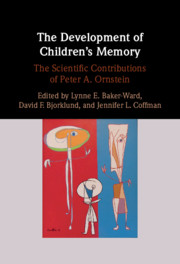Book contents
- The Development of Children’s Memory
- The Development of Children’s Memory
- Copyright page
- Dedication
- Contents
- Figures
- Tables
- Contributors
- Part I Backdrop
- Part II Children’s Memory Strategies
- Part III Children’s Event Memory
- Part IV Family Socialization of Memory
- Part V Classroom Socialization of Memory
- Chapter 15 Overview
- Chapter 16 Children’s Accuracy and Strategy Use in the Context of Addition
- Chapter 17 The Socialization of Cognition in the Classroom
- Chapter 18 Creating a Life in Science
- Part VI Perspective
- References
- Index
Chapter 16 - Children’s Accuracy and Strategy Use in the Context of Addition
Extending the Impact of Metacognitive Language to Children’s Academic Skills
from Part V - Classroom Socialization of Memory
Published online by Cambridge University Press: 28 May 2021
- The Development of Children’s Memory
- The Development of Children’s Memory
- Copyright page
- Dedication
- Contents
- Figures
- Tables
- Contributors
- Part I Backdrop
- Part II Children’s Memory Strategies
- Part III Children’s Event Memory
- Part IV Family Socialization of Memory
- Part V Classroom Socialization of Memory
- Chapter 15 Overview
- Chapter 16 Children’s Accuracy and Strategy Use in the Context of Addition
- Chapter 17 The Socialization of Cognition in the Classroom
- Chapter 18 Creating a Life in Science
- Part VI Perspective
- References
- Index
Summary
This chapter builds on the original findings of the Classroom Memory Study and outlines the ways in which children’s academic skills are also influenced by the types of language that (1) parents use during the course of conversations about the past, and (2) teachers use during classroom instruction. We present findings from a number of studies to illustrate that kindergarten students’ accuracy and strategy use in the context of mathematics is influenced by exposure to metacognitive language at home and at school. In addition, we explore the impact of kindergarten teachers’ metacognitive language on children’s mathematics accuracy and strategy use across the first two years of formal school for those children who enter school with relatively low mathematical knowledge. Finally, we emphasize that a commitment to examining instructional approaches and methods of assessment that focus on students’ metacognitive understanding will be critical to the evolution of the Classroom Memory Study and to studying the socialization of children’s cognition more broadly.
- Type
- Chapter
- Information
- The Development of Children's MemoryThe Scientific Contributions of Peter A. Ornstein, pp. 258 - 272Publisher: Cambridge University PressPrint publication year: 2021

